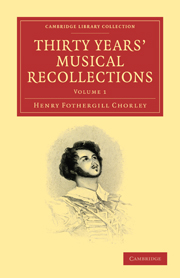THE YEAR 1847
Published online by Cambridge University Press: 29 August 2010
Summary
From this time forth—during some years—there were two Opera-houses. The secession of many artists, and of a large part of the orchestra and chorus, and that in the wake of their conductor, left Her Majesty's Theatre very bare.—Possibly it was an inevitable device, that, as provision for expected performances, there should be a provision of promises,—singular to recollect, now that their utterly unsubstantial basis is known. It was announced that M. Meyerbeer was to bring his “Camp de Silesie” to London—that opera which he has never allowed to travel beyond the barriers of Berlin,—aware, it may be fancied, of its weakness.—It was undertaken that Mendelssohn should, in the same season, produce his opera of “The Tempest.”—There was, thirdly, to be a new opera by Signor Verdi.
Of these three promises, the last alone was performed. It may be doubted whether anything beyond the merest preliminary negotiations had been entered into with the two great German masters. The subject of Shakespeare's delicious faëry dream had always attracted Mendelssohn. So long, ere this time, as the date of his residence in Dusseldorf, he had been in consultation with Herr Immermann on the best form of arranging Shakspeare's “Tempest” for music. I believe, that even there may have been one or two pieces sketched, if not composed by him, for the drama which never could come to pass.—But, in the autumn of this year in question, 1847, during the two memorable days I spent with him at Interlacken, a few weeks before his decease, he spoke with earnest displeasure at the unwarrantable manner in which his name had been traded on by the management of a particular theatre.
- Type
- Chapter
- Information
- Thirty Years' Musical Recollections , pp. 293 - 312Publisher: Cambridge University PressPrint publication year: 2009First published in: 1862



